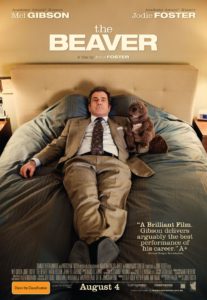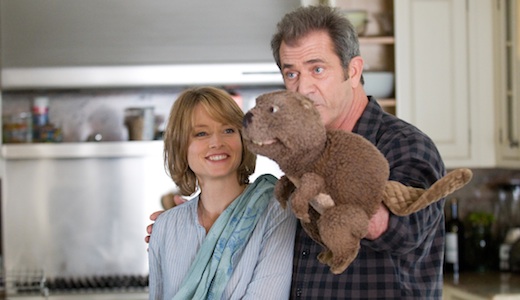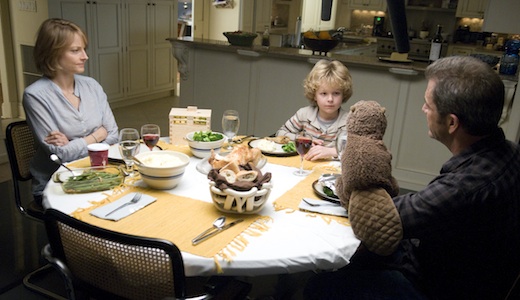 There are some definite parallels between Mel Gibson’s career and The Beaver. Following a series of off-screen controversies, beginning with a 2006 anti-Semitic tirade to an arresting police officer, it seemed that Gibson just couldn’t stay out of hot-water. In the four years following the misguided 2006 directorial effort Apocalypto, the two-time Academy Award winner could get arrested in Hollywood, but until 2010’s Edge of Darkness, he remained largely unemployed. He did, however, earn the Sexist Pig Award from the Alliance of Women Film Journalists in 2011. Enter Jodie Foster, who has been working in the industry for over 45 of her 48 years of age. If anyone knows their way around the politics of Hollywoodland, it’s Foster.
There are some definite parallels between Mel Gibson’s career and The Beaver. Following a series of off-screen controversies, beginning with a 2006 anti-Semitic tirade to an arresting police officer, it seemed that Gibson just couldn’t stay out of hot-water. In the four years following the misguided 2006 directorial effort Apocalypto, the two-time Academy Award winner could get arrested in Hollywood, but until 2010’s Edge of Darkness, he remained largely unemployed. He did, however, earn the Sexist Pig Award from the Alliance of Women Film Journalists in 2011. Enter Jodie Foster, who has been working in the industry for over 45 of her 48 years of age. If anyone knows their way around the politics of Hollywoodland, it’s Foster.
Depressed toy executive Walter Black (Gibson) can’t seem to get out of a funk. When he is kicked out by his wife Meredith (Foster, Nim’s Island), much to the delight of his eldest son Porter (Anton Yelchin, Star Trek), he is quite literally pushed to the edge in a suicide attempt. However, he is brought back from the brink by taking solace in a beaver puppet that he finds in the trash. Relating to the world via the puppet, who speaks with a cockney accent and he insists is called Beaver, Walter creates a psychological barrier between himself and his problems, allowing him to finally relate to his family and youngest son in a way he never had before.
The premise of The Beaver is somewhat of a stretch, especially given the erratic behaviour that Walter exhibits throughout the film. Any responsible wife would have checked him into the looney bin before the end of the opening credits, but such is the stuff of movies. Something of a mainstream version of the similarly plotted Lars and the Real Girl, substituting a sex doll for a beaver (struggling not to make the obvious joke here), The Beaver plays its morality tale as more of a straightforward piece. It is also aided greatly by the performances of the leads, both of whom remind us why they have been so commended in the past for their performances and directorial skills. Walter is a tragic figure, and perhaps even a lost case, and what makes Gibson’s performance a brave one is not the fact that he is sticking a puppet on his hand and doing a silly voice, as that could be just as much a shield for an actor as the beaver is for Walter. Rather, Gibson draws upon his own experiences of hitting rock bottom and clawing his way back up, and puts these emotions on the screen for the world to see. It is a sincere performance, even if the overall film is not as sincere at times.
The Beaver often goes to some dark places, and it is pleasing to see mental health being dealt with as something that is not an easy one-shot fix. Although there is some levity to be had in Walter’s situation, it is always tinged with an air of awkwardness and does not lead to the universally happy ending that a lesser film would strive for. Yet The Beaver is still an odd film, which would be labelled risky were the star of the film not already on the outskirts of Hollywood favour, and the central contrivance is more than slightly out of step with the current trend in dark comedies. This is, after all, a film about a man with his hand stuck up a puppet’s rear end. Yet there are also times when the film manages to shed a stark light on the realities of depression and its wider effects on family units. It is just a shame that for all of the great movies that have been made about depression, and all the ones that are yet to be made, the mainstream is still not ready to deal with the issues without a ‘gimmick’ to filter them to everyday people.
[stextbox id=”custom” caption=”The Reel Bits”]The Beaver is a curiosity of sorts: finely acted, often touching and occasionally dark, the performances smooth out the rough edges.[/stextbox]
[stextbox id=”grey”]![]() USA | 91 minutes | Director: Jodie Foster | Starring: Mel Gibson, Jodie Foster, Anton Yelchin
USA | 91 minutes | Director: Jodie Foster | Starring: Mel Gibson, Jodie Foster, Anton Yelchin
[/stextbox]
The Beaver is released in Australia on 4 August 2011 from Icon.
The Reel Bits is the cinema arm of DVD Bits. Richard can be found on Twitter @DVDBits. The Reel Bits is also @The_ReelBits





